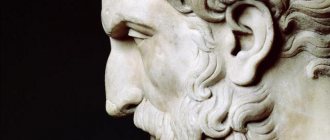Life philosophy is a person’s system of views. The search for answers to the main questions in life, what is its meaning, why, what and how to do, does not stop. Since ancient times, the minds of philosophers have been pondering this. Dozens of teachings have been formed, but people still ask themselves these questions.
Philosophy of life - basic ideas
The philosophy of life united various directions, united by common ideas. It arose as a reaction to outdated philosophical traditions determined by rationalism. The ideas of the philosophy of life are that being is the fundamental principle, and only through it can something be comprehended. All rational methods of understanding the world are in the past. They are being replaced by irrational ones. Feelings, instincts, faith are the main tools for comprehending reality.
Irrationalism and philosophy of life
Irrationalism is based on the uniqueness of human experience, the importance of instincts and feelings, as opposed to rational knowledge. It, like romanticism in literature, became a reaction to rationalism. Reflected in the historicism and relativism of Wilhelm Dilthey. For him, all knowledge was conditioned by a personal historical perspective, so he asserted the importance of the humanities.
Johann Georg Hamann, a German philosopher, rejected the process of reflection and sought truth in feeling and faith. Personal confidence is the final criterion of truth. His colleague in the literary group Sturm und Drang, Friedrich Jacobi, exalted the certainty and clarity of faith at the expense of intellectual knowledge.
Friedrich Schelling and Henri Bergson, concerned with the uniqueness of human experience, turned to intuitionism, which “sees things invisible to science.” Reason itself was not annulled, it lost its leading role. Instinct is the engine that underlies existence. Pragmatism, existentialism, irrationalism are a philosophy of life that has expanded the understanding of human life and thought.
The meaning of human life - philosophy
The problem of the meaning of life in philosophy has been and remains relevant. Philosophers of different directions have been looking for answers to the questions, what is the meaning of life and what makes life meaningful over the centuries:
- Ancient philosophers were unanimous in the opinion that the essence of human life lies in the desire for good and happiness. For Socrates, happiness is equal to the improvement of the soul. For Aristotle - the embodiment of human essence. And the essence of a person is his soul. Spiritual work, thinking and knowledge lead to the achievement of happiness. Epicurus saw meaning (happiness) in pleasure, which he represented not as pleasure, but as the absence of fear, physical and spiritual suffering.
- In the Middle Ages in Europe, the idea of the meaning of life was directly related to traditions, religious ideals and class values. There is a similarity here with the philosophy of life in India, where repeating the life of ancestors and maintaining class status are key.
- Philosophers of the 19th and 20th centuries believed that human life is meaningless and absurd. Schopenhauer argued that all religions and philosophies are only attempts to find meaning and make a meaningless life bearable. Existentialists, Sartre, Heidegger, Camus, equated life with absurdity, and only a person could give it some meaning through his own actions and choices.
- Modern positivist and pragmatic approaches argue that life takes on the meaning that is important for an individual within the framework of his reality. It can be anything - achievements, career, family, art, travel. What a particular person values his life for and what he strives for. This philosophy of life is very close to many modern people.
Life philosophy
Life philosophy is a way of seeing yourself, the world and the people around you.
Movie "The Lion King"
No problem philosophy: think about yourself, fill your belly and have fun. Hakuna Matata!
In accordance with the vision of life, life values and strategies, in connection with the chosen or habitual position in life, everyone has their own philosophy of life: a system of beliefs, what is right and wrong, how to treat and strive for what. “No one owes anyone anything”, “The strongest wins”, “Everything depends on me” or “You can’t trust anyone” - there are many options for life philosophy. Depending on how thoughtful the philosophy of life is, it can be effective or not, promoting development or stopping it.
Life philosophy can be positive and negative, optimistic or pessimistic, with an emphasis on the Self or on others, with different life positions (Creator, Consumer, Parasite, Romantic), aimed at development or created for the purpose of psychological protection (see).
There are many philosophies of life. The difference between the most famous of them can be illustrated by the example of seeing a glass. Yes, Glass. Shall we try?
- Buddhism: There is actually no glass.
- Judaism: why is the glass half empty only with us?
- Orthodoxy: the glass is half empty for our sins.
- Catholicism: The glass is only half empty for bad people.
- Islam: There is no glass but a glass.
- Freudianism: You were underwatered as a child.
- Realism: That's right, it's a glass.
- Stoicism: yes, the glass is half empty - that’s what I need.
- Communism: everyone has the right to a full glass.
- Socialism: the glass is empty, but everyone has the same.
- Capitalism: glass for sale, inexpensive.
- I don't care: So what?
- Skepticism: Is this a glass?
- Confucianism: Be as serene as this glass
- Yogi: you are the glass and its contents.
- And only physicists know: the glass is always full!
- Life is unique or your Self moves from life to life, incarnating in different bodies;
- Life is joy, or life is a challenge, or life is like a zebra.
The philosophy of life is well reflected in the Metaphor of Life.
Cultural interpretation
A way of seeing (perceiving) a situation, given by the local culture or chosen by the person independently.
We can say that this is the choice of the most suitable Life Tale. Positive and promising is probably best. See Emotions and Vision
Elements of life philosophy
Life philosophy includes:
1. General views on life, vision of the picture of life.
2. Beliefs about yourself and others.
- I’m Okay, You’re Okay, or very differently: Everyone is an enemy, people can’t be trusted.
- I am a small person, I can do little, I have nothing to claim... - or the life philosophy of the Winner: “The world belongs to me!”
3. Predominant life strategies, ways of living and life principles.
- Position of the Victim or position of the Author
If for some reason you think that someone else should solve your problems for you, and not you, then you have an unsuccessful philosophy of life, and it is difficult to move through life confidently with it. Accustom yourself to the position of the Author: “I planned it - I will do it!” After this, by the way, it will be much easier for you to be friends with people and cooperate. People can help, that's great, and it can be used!
- Position of the Creator, Consumer, Romantic or Parasite: “You die, and then I will die.”
Changing Life Philosophy
How to change your philosophy of life? Communicate with those people who have a philosophy that is attractive to you, and redraw your Metaphor of life. This seems surprising, but you can change your vision of the world by implanting new pictures and visions into your pictures of the world. Through working with the Metaphor of Life, you can effectively change not only your philosophy of life, but also the philosophy of life of another person - of course, if he himself does not mind.
Development direction
Useful exercises and pictures that can enrich your philosophy of life:
- Exercise "Okay"
- The world belongs to me (develops a sense of self-confidence)
Philosophy of life and death
The problem of life and death in philosophy is one of the key ones. Death as a result of the process of life. Man, like any biological organism, is mortal, but unlike other animals, he is aware of his mortality. This pushes him to think about the meaning of life and death. All philosophical teachings can be divided into two types:
- There is no life after death
. After death there is no existence; along with a person’s body, his soul and his consciousness perish. - There is life after death
. A religious-idealistic approach, life on earth is a preparation for the afterlife or reincarnation.
Books about the philosophy of life for self-development
Fiction can be an excellent source of philosophical enlightenment. Not only scientific or popular science books written by philosophers introduce new philosophical ideas and give impetus to spiritual development. Five books that present the philosophy of human life:
- "Stranger"
. Albert Camus. The book is fiction; in it the author managed to reflect the basic ideas of existentialism, even better than in philosophical treatises. - "Siddhartha"
. Hermann Hesse. This book will take your thoughts from worries about the future to thoughts about the beauty of the present. - "The Picture of Dorian Grey"
. Oscar Wilde. A great book about the dangers associated with pride and vanity, in it the reader will find a lot of self-reflection and sensory exploration. - "Thus Spoke Zarathustra"
. Friedrich Nietzsche. Nietzsche built one of the most original and radical philosophies in his entire history. His ideas continue to send shock waves through the Christian community. Most people reject Nietzsche's slogan that "God is dead", but in this work Nietzsche actually explains this statement and voices interesting ideas about life on Earth. - "Transformation"
. Franz Kafka. One day, waking up, the hero of the story discovers that he has turned into a large insect...
Philosophy in accessible language: the philosophy of Nietzsche
Nietzsche's philosophy
: Friedrich Nietzsche is one of the most complex philosophers of the 19th century.
His ideas are received in completely different ways. The only thing that can be said is that there are no people indifferent to his ideas. Friedrich Nietzsche is a man about whom history has created an ambivalent impression. A person who is impossible to read without experiencing any emotions. You can either accept or hate this thinker. Nietzsche's philosophy
has long been associated with Nazism and fascism, in particular with the ideology of the superior Aryan race. To this day, Nietzsche is accused of being the founder of the fascist view of the world and it is he who is to blame for the fact that Hitler promoted and began to use the idea of the famous “blond beast”. Nietzsche himself said that his philosophy would be accepted and understood only 200 years after his death.
PHILOSOPHY OF NIETZSCHE. LIFE AND ART.
Years of life of Friedrich Nietzsche 1844 - 1900. It is interesting that his whole life was accompanied by terrible headaches, which eventually led him to madness. The fate of the philosopher is quite unique. Initially, Nietzsche in no way connects his life path and work with philosophy. He was born into a fairly religious family and had a good upbringing. His mother instilled in him a love of music and in the future he will become very good at playing musical instruments. Nietzsche's interest in philosophy manifested itself in his student years, when he was training as a future philologist. Nietzsche was not an ardent admirer of philology. It is known that for some time he was even seriously interested in the natural sciences, and in particular chemistry. Nevertheless, without a doctoral dissertation, without a candidate's dissertation, at the age of 24 he becomes the youngest professor in the field of philology.
In 1870, the Franco-Prussian War begins and Nietzsche asks to volunteer as a soldier or orderly. The government gives him permission to go to the front as a medical orderly. Having become a nurse, he sees all the pain and dirt on the battlefield of this war. During the war, he himself had to be on the verge of death more than once. Returning home, he again engaged in university affairs, but over time he announced his retirement from philology, saying that he felt stuffy and could not do his favorite thing, creativity, namely composing and writing books. At the age of 35, Nietzsche left philology. He lives on a fairly modest pension and writes a lot. Just two years later, Germany will start talking about him not as a philologist, but as a very talented philosopher.
PHILOSOPHY OF NIETZSCHE. BASIC PHILOSOPHICAL IDEAS
His new philosophical ideas became very popular because they were unusual and original. The views that he promoted were impossible not to notice.
Nietzsche's Anti-Christian Philosophy: A Work entitled "The Anti-Christian".
In this work, Nietzsche calls on humanity to make a total reassessment of the values of the previous culture, especially Christian culture. Christian culture, morality, literally infuriated the author and he hated it with all his being. What irritated Nietzsche so much about Christianity? Nietzsche says that in fact, if we try to answer for ourselves the question: “can there be equality between people?” (namely, this is one of the ideas of the Christian religion), then we will inevitably answer “NO.” There cannot be any equality because initially, someone may know and be able to do more than others. Nietzsche distinguishes two classes of people; people with a strong will to power, and people with a weak will to power. Those who have a weak will to power outnumber the former many times over. Nietzsche says that Christianity glorifies the majority (that is, people with a weak will to power) on a pedestal. This majority is not fighters by nature. They are the weak link of humanity. They do not have the spirit of confrontation, they are not a catalyst for the progress of humanity.
Another idea of Christianity to which Nietzsche was extremely categorical is the biblical commandment “Love your neighbor as yourself.” Nietzsche says, “How is it possible to love a neighbor who may be lazy and behave terribly. The neighbor who smells bad, or is infinitely stupid.” He asks the question “Why should I love such a person?” Nietzsche's philosophy
regarding this issue is as follows; If I am destined to love someone in this world, then only “my distant one.” For the simple reason, the less I know about a person, the further he is from me, the less I risk being disappointed in him.
Christian charity
, also came under fire from Friedrich Nietzsche. In his opinion; By helping the poor, the sick, the weak and all those in need, Christianity puts on a mask of hypocrisy. Nietzsche seems to accuse Christianity of protecting and promoting weak and unviable elements. If you are exposed to these elements (that is, people), they will die because they are not able to fight for their existence. The main principle of this idea in Nietzsche is that by helping and being compassionate a person over time becomes a weak and unviable element. By helping and becoming merciful, a person contradicts nature itself, which destroys the weak.
Philosophy of Nietzsche: Interaction of conscious and subconscious elements, or “The Will to Power”
This idea is that the entire content of our consciousness, which we are so proud of, is determined by deep life aspirations (unconscious mechanisms). What are these mechanisms? Nietzsche introduces the term “Will to Power” to denote them. This term denotes a blind, unconscious instinctive movement. This is the most powerful impulse that controls this world. Nietzsche divides “will” into four parts: the will to live, the inner will, the unconscious will and the will to power. All living beings have the will to power. The will to power is defined by Nietzsche as the ultimate principle. We find the action of this principle everywhere at any stage of existence, either to a greater or lesser extent.
Nietzsche's philosophy: “Thus spoke Zarathustra,” or the idea of the superman.
Who is superman according to Nietzsche? Of course, this is a man with enormous will. This is a person who controls not only his own destiny, but also the destinies of others. The superman is the bearer of new values, norms, and moral guidelines. The superman must be deprived; COMMONLY ACCEPTED moral standards, mercy, he has his own new view of the world. Only someone who is devoid of conscience can be called a superman, because it is she who controls the inner world of man. Conscience has no statute of limitations; it can drive you crazy and lead to suicide. The superman must be free from its shackles.
Nietzsche's philosophy, his superman and Nietzsche himself appear before us in a not entirely attractive form, but here I would like to explain that Nietzsche endowed the superman with creative, spiritual qualities, complete concentration on power, and absolute self-control.
Nietzsche says that a superman must be characterized by super-individualism (unlike modernity, where a person’s personality is completely leveled). The superman has a bright individuality and strives for self-improvement. In his work, the philosopher clearly says that the supremacy of the superman can only be in the spiritual sphere, that is, not in the sphere of political economics or law “ONLY THE DOMINATION OF THE SPIRIT.” Therefore, it would be wrong to consider Nietzsche the founder of fascism. Nietzsche's philosophy: slave morality and master morality.
Nietzsche says that master morality is a high degree of self-respect.
This is the feeling of being a person, a person with a capital “P,” when a person can say about himself “I am master of the spirit.”
The morality of slaves is the morality of usefulness, cowardice and pettiness. When a person humbly accepts humiliation for his own benefit.
(source: Lecture on philosophy, Ph.D., associate professor Elena Leonidovna Pavlova)
Video on the topic: The philosophy of Friedrich Nietzsche and the theory of the superman today.
Films about the philosophy of life
Directors turn to the theme of human life in their films. Films about the philosophy of life that will make you think:
- "Tree of Life"
. Directed by Terrence Malick. This movie raises millions of rhetorical questions about the meaning of life, the problem of human identity. - "Eternal Sunshine of the Spotless Mind"
. The film by Michel Gondry, released in 2004, is a kind of philosophical teaching about how to live your life, accept mistakes and not forget about them. - "Fountain"
. A fantastic movie from Darren Aronofsky will show new interpretations of reality.
KONSPEKTY.NET
The universal laws of wisdom are the same for all countries, peoples and cultures. Wise people have always been especially revered. As you know, wisdom and intelligence are completely different concepts. Intelligence is manifested in the ability to effectively assimilate, analyze, structure information, and find new ways to solve old problems. Wisdom is an integral concept. It includes both a deeper degree of developed intelligence and life experience. Wisdom is that same middle path, balance, harmony, the golden mean, the ability to see the essence and root of things, a peculiar form of clairvoyance.
If you want to become wise, then you will probably have to either go through the extreme development and complexity of the intellect, or go through experience and rely on internal vision and intuitive knowledge of the situation. In the first case, you will simply reach a certain intellectual limit, see dead ends in solving many problems, become disappointed in the capabilities of the mind and understand that they are not total. Wisdom can also be called choosing the optimal solution, the best option from the set. And in order to see this very multitude, you must either again have a powerful intellect, or no less strong intuition.
In order to understand the laws of wisdom, the easiest way is to read and study the works of the greatest sages of mankind. These, of course, will include religious writers and philosophers. You might just want to watch people and study yourself and them. Such experience also leads to wisdom. But then you will have to follow the spiritual path, meditate or pray regularly. It would be optimal to combine both paths, but this will require a huge investment of time and energy. Wisdom doesn't come easy, so expect many, many years of work.
If you dream of becoming wise, then the first thing you need to do is learn to be silent. The word has enormous power. Any word we utter is a program for implementation that we give to ourselves and others. Often irritated mothers shout at their children and utter, to put it mildly, not very nice words. It seems to them that they wish the child well, but in fact they are deforming his psyche with their negative programs. If the situation is repeated many times, then the child grows up as an inferior and sick loser, unsure of himself and with a lot of complexes.
Say only what is necessary, and only when it is really necessary. Train yourself not to utter a single word that you can do without. Weigh your speech, give yourself and others only positive programs, and you will see how quickly the quality of your life and your thinking will change.
Of course, it will be difficult to curb your speech instantly. To help yourself, there is one slightly complex, but incredibly effective technique. This is the practice of silence. For the whole day, turn off the incoming flow of information: TV, Internet, books, player. On this day you need to be silent. Warn all your loved ones, friends and acquaintances about this in advance so that they do not distract you. At the end of the practice, you will begin to speak less and choose your words much more carefully. An even more extreme version of this exercise is three days of silence.
Download this material:
Please rate the material you read :)
(No ratings yet) Loading…
Related Posts
- Philosophy of Socrates in brief
- Philosophy of Confucius in brief
- Berdyaev's philosophy in brief
- Descartes philosophy briefly
- What is Aristotle's philosophy? Brief and clear
- Video: Philosophy of life in brief
- Briefly about Bacon's philosophy. Philosophy of new times...
- Plato's philosophy in brief
- The philosophy of Plato and Aristotle in brief
- The philosophy of Marxism in brief
- Voltaire's philosophy briefly
- Kant's philosophy is brief and clear










